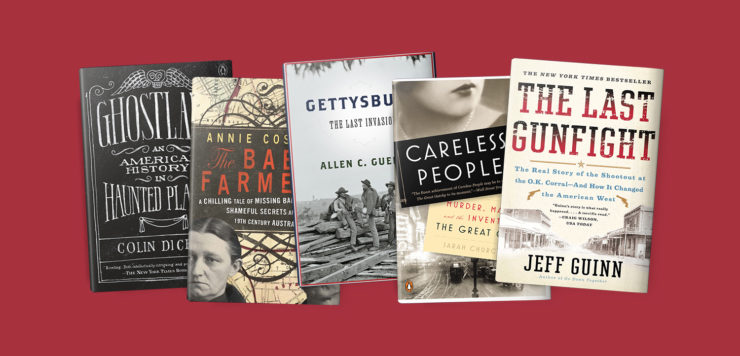I have to confess right off the bat that I don’t read very much fiction anymore. I read history and true crime (and am especially fond of historical true crime), which does tend to come out in my writing. In The Angel of the Crows, I figured out why I’d been reading all those books about Jack the Ripper. I’m still waiting to find out why I read about the Battle of the Little Bighorn or the Salem witchcraft crisis or the Shoot-out at the O.K. Corral. Sooner or later, my brain will tell me.
Ghostland by Colin Dickey
I loved this book. Dickey looks at haunted places: houses, hotels, brothels (the bit on Mustang Ranch was great), bars, prisons, cemeteries, a park under a bridge. He has a wonderful section on New Orleans. Dickey is terrier-like in his determination to dig out the facts behind ghost stories. Not surprisingly, most of the time he finds there AREN’T very many facts and most of them have been twisted out of true by the needs and tropes of the ghost story as a genre. (The section on the House of Seven Gables was marvelous, as was the section where he asks why all of Richmond’s Shockoe Bottom ghosts are white, when the slave markets are RIGHT THERE.) He’s interested in the cultural work done by ghost stories, and he’s very good at finding the points where that work is taking place.
The Baby Farmers by Annie Cossins
This is a fascinating book about the Victorian practice of baby farming (where unmarried mothers paid people to “adopt” their babies, the babies then being left to die from a combination of starvation, neglect, and opium. Or strangulation, which was quicker. Baby farmers “adopted” multiple babies at a time, where the money they were making from these “adoptions” wasn’t sufficient to support them, so they had to kill them to make way for the adoption of more babies.) John and Sarah Makin were baby farmers in Sydney, who through a long chain of remarkable circumstances, were tried and convicted of a murder that wasn’t even proven to have been committed, since the prosecution proved neither the baby’s identity nor that the baby’s death was willful murder. Cossins does a great job with the legal issues, and she uses statistics on infant mortality and illegitimate children in the 1880s and 1890s (plus some careful research on syphilis) to excellent effect.
Gettysburg: The Last Invasion by Allen C. Guelzo
This is an exhaustive, blow-by-blow account of both sides of the Battle of Gettysburg. It is intensely readable, which is good because it is massive. Guelzo is a terrific writer, and he’s done his homework gathering primary accounts. He’s also really good about stepping a pace back when there’s a controversy, examining both sides of it, and making his own judgment.
Careless People by Sarah Churchwell
This is an excellent book that’s a little bit difficult to describe. It’s part biography of F. Scott and Zelda Fitzgerald, part history of the Jazz Age, part literary analysis of The Great Gatsby, and part examination of the unsolved Hall-Mills murder that was part of the inspiration for Gatsby. Churchwell does an amazing, effortless-seeming job of moving between her topics, always linking one back to the other three. She has combed exhaustively through primary sources, including Fitzgerald’s scrapbook of newspaper clippings about himself, biographies and autobiographies of people the Fitzgeralds met in New York and Long Island in the early 1920s, and letters, his to her, hers to him, theirs to other people. This book is beautifully written and fascinating. She conjures up the Fitzgeralds’ glittering world while at the same time making clear how savagely self-destructive it was. “Careless people” is of course a quote from Gatsby, but it also describes Scott and Zelda, and there was nothing they were more careless with than themselves.
The Last Gunfight by Jeff Guinn
Jeff Guinn has a system for writing books. He goes and talks to people, witnesses and relatives if he can get them. He interviews people who have written books on the subject and other researchers. And then he synthesizes it all into beautifully readable text. I don’t know if this is the BEST book on Wyatt Earp and Tombstone and the Gunfight (somewhere near) the O.K. Corral that I have read (that honor may belong to Paula Mitchell Marks’ And Die in the West), but it is a very balanced, very readable, very historically conscientious account of what happened to the best of anybody’s ability to tell. Guinn also does a great job of explaining the aftermath of the gunfight, the inquest, and the hearing, and how it came about that the Earps (Wyatt, Virgil, Morgan) and Doc Holliday weren’t prosecuted for murder. And his last chapter is a thoughtful exploration of how the event—a shoot-out in a vacant lot where both sides were wrong and both sides lied about it afterwards—turned into the epitome of Good defeating Evil as it plays out in the “Wild West” of our collective (white) American imagination. Excellent book.
Katherine Addison’s short fiction has been selected by The Year’s Best Fantasy and Horror and The Year’s Best Science Fiction. She lives near Madison, Wisconsin. The Angel of the Crows, a fantasy novel of alternate 1880s London, is published by Tor Books.










